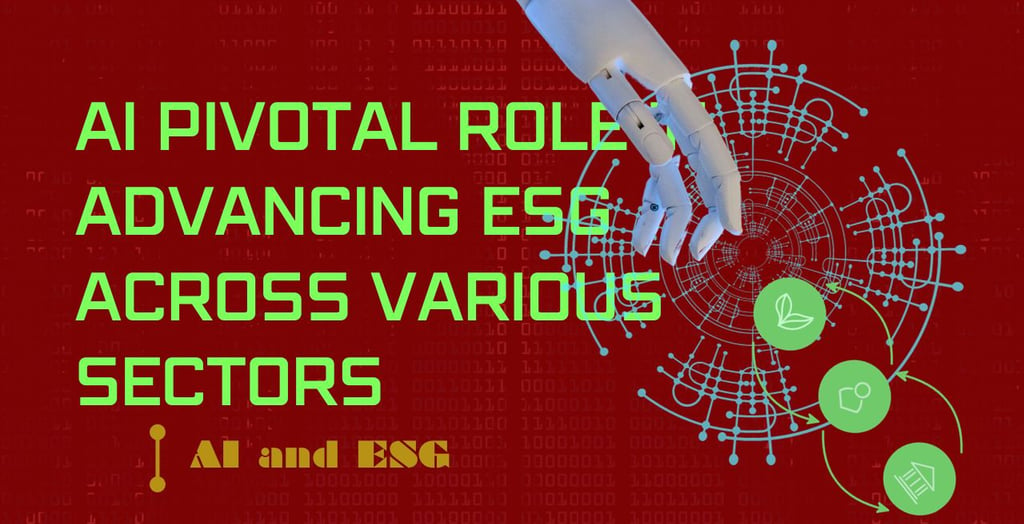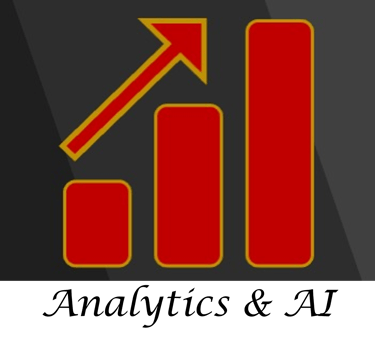AI Pivotal Role in Advancing ESG Across Various Sectors
ARTIFICIAL INTELLIGENCEESG
Analytics & AI Staff
1/9/20244 min read


AI Pivotal Role in Advancing ESG Across Various Sectors
Integrating AI with ESG principles presents a powerful opportunity to address and tackle pressing environmental, social, and governance challenges and issues. The synergy between ESG and AI has the potential to drive considerable progress towards a more sustainable and equitable future. AI's role in advancing ESG initiatives is rapidly expanding across diverse sectors, each with unique opportunities and challenges.
ENERGY and UTILITIES
Renewable Energy Integration:
AI optimizes grid stability by integrating intermittent renewable sources like solar and wind, predicting fluctuations and dispatching traditional power when needed.
Energy Efficiency:
AI analyzes building data to recommend energy-saving measures, controls smart thermostats and lighting systems, and identifies inefficiencies in industrial processes.
Decarbonization:
AI models predict carbon emissions from various sources and design strategies for reduction, like optimizing transportation routes or promoting fuel-efficient vehicles.
Demand Forecasting:
AI predicts energy consumption patterns, enabling utilities to optimize generation and distribution, reducing overall energy waste.
MANUFACTURING and SUPPLY CHAIN
Sustainable Supply Chains:
AI tracks materials and products throughout the supply chain, ensuring ethical sourcing, minimizing waste, and optimizing transportation logistics.
Circular Economy:
AI facilitates closed-loop systems by identifying reusable materials, predicting equipment maintenance needs, and automating recycling processes.
Pollution Reduction:
AI monitors emissions from factories and predicts potential pollution events, enabling real-time interventions and compliance with environmental regulations.
AGRICULTURE and FOOD INDUSTRY
Precision Agriculture:
AI analyzes soil data, weather patterns, and crop health to optimize irrigation, fertilization, and pesticide use, reducing environmental impact and increasing yields.
Livestock Management:
AI monitors animal health and welfare, optimizing feed allocation, detecting diseases early, and improving farm efficiency.
Sustainable Food Production:
AI helps develop climate-resilient crops, reduces food waste throughout the supply chain, and optimizes food distribution networks.
FINANCE and INVESTMENT
Green Finance:
AI identifies and assesses investments in sustainable projects, promotes ESG integration in investment portfolios, and detects greenwashing attempts.
Impact Investing:
AI analyzes data to measure the social and environmental impact of investments, guiding investors towards impactful projects and companies.
Risk Management:
AI identifies and mitigates ESG-related risks, such as climate change or social unrest, helping financial institutions make informed decisions and ensure long-term sustainability.
HEALTHCARE and PHARMACEUTICALS
Personalized Medicine:
AI analyzes patient data to predict disease risk, recommend personalized treatment plans, and develop targeted therapies.
Early Disease Detection:
AI analyzes medical images and scans to detect diseases like cancer at early stages, improving treatment outcomes and patient survival rates.
Resource Optimization:
AI optimizes hospital operations, scheduling appointments, allocating resources efficiently, and reducing healthcare costs.
Outcomes:
AI enhances diagnostics, drug discovery, improving healthcare outcomes and accessibility.
TRANSPORTATION and LOGISTICS:
Logistics Operations:
AI optimizes logistics operations, reducing fuel consumption and emissions through route optimization and predictive maintenance.
Transportation Optimization:
AI contributes to the development of autonomous vehicles, potentially reducing accidents and optimizing traffic flow.
REAL ESTATE and CONSTRUCTION:
Sustainable Infrastructure:
AI designs and maintains sustainable infrastructure, like smart grids or flood-resistant buildings, ensuring resilience to climate change.
Construction Optimization:
AI assists in designing energy-efficient buildings, optimizing construction materials, and reducing carbon footprints in construction.
Building Management:
AI helps in smart building management systems for efficient resource usage and environmental impact reduction.
Smart Cities:
AI optimizes energy use in public buildings, monitors air quality, and improves disaster preparedness and response.
TECHNOLOGY and IT SERVICES:
Data Centers:
AI contributes to reducing energy consumption in data centers and optimizing processes for sustainability.
Frameworks:
AI aids in developing ethical AI frameworks and mitigating biases in AI systems.
SOCIAL IMPACT
Poverty:
AI tackles social challenges like poverty, by optimizing resource allocation, identifying vulnerable populations, and designing targeted interventions.
Hunger:
AI enhances food distribution by optimizing supply chains, reducing wastage, and ensuring timely delivery of food to areas in need.
Education:
AI facilitates remote learning and provides access to educational resources in underserved areas, bridging the education gap between urban and rural regions.
Community Support:
AI assists in disaster response and management by analyzing real-time data to predict and respond swiftly to natural disasters or crises, helping affected communities recover more efficiently.
CHALLENGES and CONSIDERATIONS:
Revolutionizing Renewables: Grid infrastructure needs modernization to fully integrate AI-powered smart grids.
Green Supply Chains: Integrating AI across complex global supply chains requires collaboration and standardized data formats.
Precision Farming: Cost of AI technology and digital infrastructure access can be barriers for small-scale farmers.
Sustainable Investing: Data quality and standardization within the ESG ecosystem have limitations.
Personalized Medicine: Addressing ethical concerns around data privacy and ensuring equitable access to AI-powered healthcare.
Ethical Considerations: Transparency, fairness, and accountability must be embedded in AI development and deployment.
Collaboration: Stakeholders across sectors and disciplines need to collaborate to develop and implement AI solutions for ESG issues.
Human Oversight: AI is a powerful tool, but human expertise and judgment remain crucial for guiding its application towards positive societal impact.
The integration of AI and ESG principles is essential for companies aiming to create sustainable business models and contribute positively to society. Companies need to embed ESG considerations into their AI strategies, and need to ensure that AI initiatives align with sustainability goals, promote social well-being, and adhere to ethical standards, such as:
Data Transparency: Ensuring transparency in data collection, processing, and usage, while respecting privacy and data protection laws.
Ethical AI Development: Creating and following guidelines that prioritize fairness, accountability, and transparency in AI systems.
Stakeholder Engagement: Involving stakeholders in the development and implementation of AI initiatives to address their concerns and ensure alignment with ESG values.
AI's ability to process large datasets, identify patterns, and generate insights at scale significantly enhances the ability to address ESG challenges effectively. AI predictive capabilities assist in proactive decision-making, allowing businesses to anticipate and mitigate risks associated with environmental, social, and governance factors.
Companies should leverage the instrumental tool that AI has become in driving ESG initiatives across various sectors. By enabling better data-driven decision-making, promoting efficiency, and identifying areas for improvement, AI has become pivotal in contributing to ESG sustainable practices and responsible business operations.
Sources:
Global Impact Investing Network - https://thegiin.org/
World Business Council for Sustainable Development - https://www.wbcsd.org/
Food and Agriculture Organization - https://aiforgood.itu.int/about-ai-for-good/un-ai-actions/fao/
National Renewable Energy Laboratory - https://www.nrel.gov/
National Institutes of Health – https://www.nih.gov
GreenBiz - https://www.greenbiz.com/
B Lab - https://www.bcorporation.net
CDP (Carbon Disclosure Project) - https://cdp.net
UN Sustainable Development Goals - https://sdgs.un.org/goals
Let's Connect!
Subscribe to our Resources





















